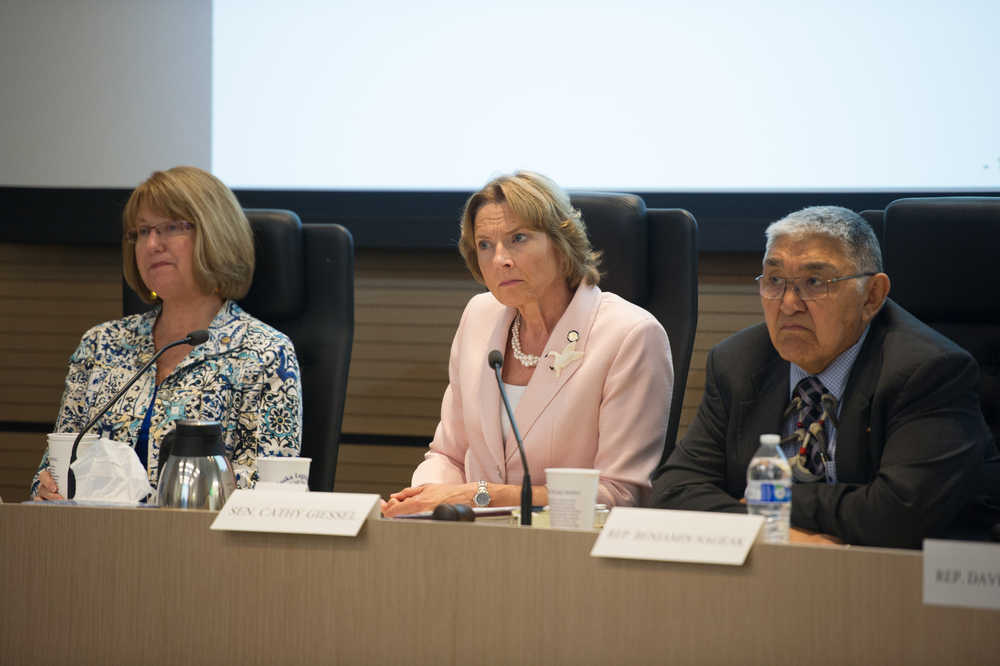Alaska Gasline Development Corp. President and CEO Keith Meyer directly addressed what he sees as one of the biggest challenges to building a gasline during his first board of directors meeting July 14, and it had nothing to do with the cost of the project.
“AGDC has an observable poor relationship with key legislators and legislative committees. I’ve seen it in the press and I’ve felt it in the (legislative) hearings. This has to change,” Meyer said July 14 during a presentation to the board.
About two weeks earlier, legislators peppered Meyer with questions for more than four hours during a marathon joint House-Senate Resources Committee hearing in which he, and representatives from the producers, gave their perspectives on the status of the in-flux Alaska LNG Project.
The June 29 hearing in Anchorage was the first time legislators were able to hold a dialogue with Meyer in a public forum, so many of the questions naturally focused on his experience in the natural gas industry and his knowledge and view of the proposed North Slope gas megaproject.
While the lines of questioning from some legislators exuded understandable skepticism in Meyer’s proposal to reshape the financing structure of the project, others bordered on interrogation backed by clear and immediate opposition to nearly everything he said.
The significant underlying problem with that, according to Meyer, is it doesn’t sit well with the “other” key partners in a gasline and it becomes a self-fulfilling prophecy.
“When the utility buyers or the (potential) investors see ‘AGDC is not experienced enough to do this project,’ who’s going to want to invest in that project if the government is saying AGDC, which is presumably a government entity, isn’t experienced enough to do this and at the same time AGDC is the only dog willing to pull the sled, willing to step into the lead?” Meyer questioned.
He added: “Then you’re basically saying the one party willing to lead this project isn’t experienced, doesn’t have the competency, nobody’s going to invest in that if they’re also reading — the Asian buyers, face it, they are our most attractive market — when they read that they’re not welcome investors in this project, well guess what, they’re not going to be. They’re not going to want to be investors.”
[Walker, lawmakers trying to breach AK LNG impasse]
Giessel said she thinks Meyer is transferring a challenged relationship between the Legislature and Gov. Bill Walker’s administration to AGDC.
She added that the entirely new concept for financing the project is, at least publicly, barely a month old and the back-and-forth is part of the vetting process.
Rep. Geran Tarr, D-Anchorage, sits on the House Resources Committee and said the change in administration, from former Republican Gov. Sean Parnell, who was mostly aligned with the Legislature’s majority caucuses, to Walker is at least playing a part in the tension.
Tarr also noted that legislators often don’t take the opportunity to attend AGDC board meetings, regardless of their standing on the board.
“I just want to know the truth (about the project) and be objective,” Tarr said.
Meyer reiterated at the board meeting that AGDC and the Alaska LNG Project needs to be more transparent to better its working relationship with other parts of government.
“Anytime you have an absence of information, that is probably filled with the worst possible scenario, and I think that’s what’s happening here. There’s not enough information out there. People want to fill in the gaps with a fear scenario,” he said.
The producers have all said they hope to monetize the North Slope gas, but don’t see the current project moving to completion on its current schedule in the mid-2020s for a myriad of factors.
• Elwood Brehmer is a reporter for the Alaska Journal of Commerce. He can be reached at elwood.brehmer@alaskajournal.com.

